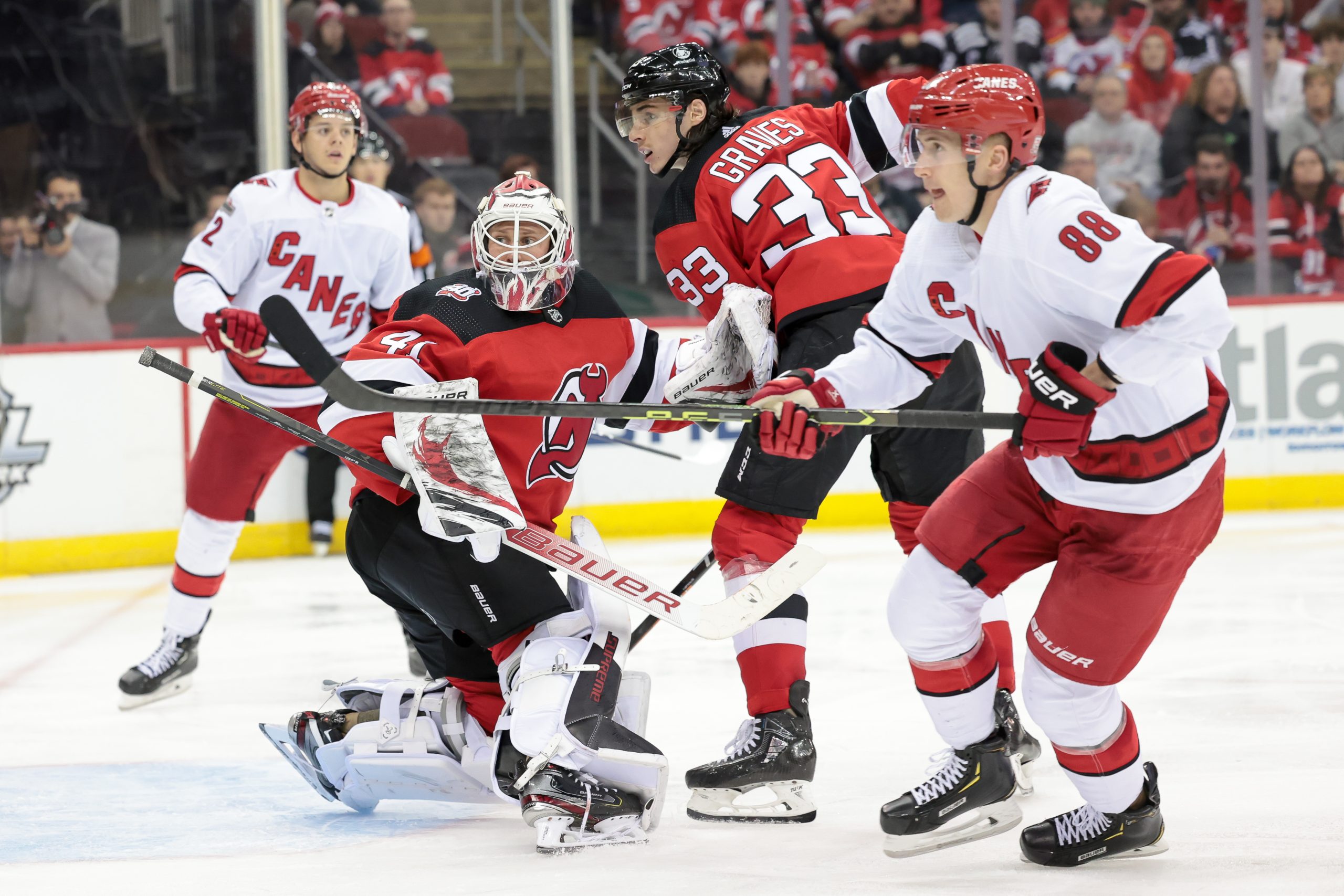The first round of the 2022-23 Stanley Cup Playoffs has come to a close and it will be the Carolina Hurricanes vs New Jersey Devils in the second round. Carolina survived the first round after a six-game series against the New York Islanders. That series featured two teams that relied strongly on the defensive side of the game. The Hurricanes did not escape unscathed however as top-six forward Teuvo Teravainen left game two with a broken wrist and did not return. Jack Drury also missed a few games with an injury but seems ready to return for this series.
New Jersey escaped the Battle of the Hudson after going the distance and winning in seven games over the New York Rangers. After losing games one and two, the Devils seemed out of the series. However, a goalie change brought in Akira Schmid in game three and he played outstandingly. The Devils speed took over, limiting the Rangers chances and culminated in a victory for the team in Newark. This series will be fairly different than the first round for either team. Both teams play at a very high pace. Can Carolina convert on their chances? Will New Jersey’s speed breakthrough Carolina’s defence? This has the potential to be a tight series.
Carolina Hurricanes vs New Jersey Devils Second Round Series Preview
Trusting the System for Carolina
While the injury bug hit Carolina before and during the first round, the team adopted a next-man-up mentality to push past the Islanders physical play. While really good but not quite as dominant in terms of shot generation and expected goals as they were in the regular season when the team played their game, they were able to succeed. This was evident in the third period of game six. Carolina does not necessarily have individual stars of the caliber that others do, but their system gives them strength as a team. The key for Carolina moving past this series is having everyone on board trusting the system. This was the case all season but with notable injuries to top forwards, this will be essential now.
As a team with a low goals scored above expected during the regular season, the Hurricanes system relies on shot generation and it proved successful in solving Vezina-caliber goalie Ilya Sorokin. They generated the second best xG% in the first round at 53.66%. (Check below to see who was first…) Not that the Islanders were a high-flying offensive team, but the Hurricanes system also shut them down when it was needed.
With the exception of the play of Sebastian Aho and the goalies, there was no real one player that took over the series. For round two, everyone needs to chip in. This means trusting the system and grinding to get gritty, playoff style goals, the defence suffocating shots and the goalies standing tall. The Devils are a very good team and will do everything to prevent the Hurricanes from playing their style. For the Hurricanes to have success, they need to overcome that adversity and stick to their game.
The Devils Speed
When you think of the New Jersey Devils this year, one word comes to mind first: speed. The team plays at a very high pace, transitioning the puck quickly and getting down the ice to generate chances off the rush. In addition to that, the Devils showed in round one their forechecking effectiveness. They also led the first round of the playoffs in xG% with a 55.25%. You could see this in their play almost all series but especially in game seven.
From puck drop it was all Devils. They would get the puck in the offensive zone and the Rangers couldn’t seem to get it out. When the Rangers turned it the other way, the Devils quickly got it out and transitioned back to dominating on the other side. Most of the disruption to that play happened when the Devils took a penalty. But even then, they stopped the Rangers (typically) deadly power play and even chipped in a shorthanded goal. This is a small snapshot of what this Devils team can do.
Looking another way, the Devils goals scored above expected was also a first round worst by a pretty large margin at -7.89. This was largely due to the play of Igor Shesterkin. Even though yeah, you’d expect to see the Devils convert more based on the chances they are generating, it also just may mean that they generated that many chances that it was hard to keep up. That and the play of Shesterkin.
The Devils also have had some of their top scorers lacking in production this first round. Newly acquired Timo Meier finished the first round with zero points. Jesper Bratt finished with just one goal, an empty netter in game seven. Captain Nico Hischier finished with zero goals. For guys expected to produce this is both concerning and encouraging. Its concerning because you wonder what it will take to get these guys going. But on the other hand, you look at the fact that the Devils just won their series without the production from those top guys. So, if they get going, even just at an improvement over round one, that could make the Devils even more deadly.
The Goalie Battle
Both of these teams have had interesting storylines when it comes to handling goaltending. Antti Raanta played most of the first round for Carolina and played very well. In five games he had a .906 SV% which was largely skewed by the late game three meltdown. In game six, Frederik Andersen took over and played outstanding. Andersen finished game six with a .971 SV% and .91 GAA. One interesting thing to look for is how Rod Brind’Amour will utilize his goalies. Moving forward, it is not clear whether one or the other will start. Brind’Amour stated the possibility that both could see time in a rotation format. That is not something you typically see in the playoffs but occasionally teams utilize it. That might turn to be a smart decision seeing the toll the playoffs can take on an overworked goalie.
The Devils started the playoffs with the goalie they relied on all season in Vitek Vanecek. During the regular season Vanecek played very well, finishing with a .911 SV% in 52 games. Starting Vanecek was the right decision. But then games one and two happened. Vanecek struggled as the Rangers put up nine goals in those two games, both at home. In game three, the Devils moved to rookie goalie Schmid. From the get-go, Schmid went head-to-head with Shesterkin and was a game changer. He finished the series with two shutouts, a .951 SV%, 1.38 GAA, and 4.5 goals saved above expected. Needless to say, it is now Schmid’s goal to lose. The Devils will undoubtedly go with Schmid in the net for the second round as they should.
For Carolina fans, New Jersey’s situation is a story that should resonate fairly well. When the Hurricanes won the Stanley Cup in 2006, they started veteran goalie Martin Gerber who they relied on all season. After losing the first two games at home, they switched to rookie goalie Cam Ward. Ward would then lead the team to their only Cup, winning the Conn Smythe trophy along the way.
Toe to Toe
Interestingly, these teams seem to be fairly similar when looking at a lot of underlying analytics and their playing style. Finishing the regular season, only one point separated these teams in the standings. It took all 82 games to figure out which would win the Metropolitan Division. They had the exact same wins and regulation wins. Their power play and penalty kill percentages were separated by only about two percent for both. The Hurricanes led the NHL in regular season xG% to be followed by the Devils in second.
For the first round of the playoffs, the numbers seem to show similar results. The Devils led round one in xG% to be followed by the Hurricanes about two percent less. Goals for and goals against only separate these teams by one and two, respectively. New Jersey does have an edge in expected goals for and expected goal differential while the Hurricanes have an edge in expected goals against. Even at 5v5 play, a lot of these metrics are very tight between these teams.
Just watching these teams, you can see the similarity in their styles too. Both move the puck quickly and try to dominate possession and shot generation. The difference is that the Devils have a little more speed and skill they use to dominate the play. Carolina plays a little heavier and more reliant on their defence in shot generation and man on man defensive coverage to suffocate shots from the other team. Compared to their chance generation, both teams are converting under expected. Carolina has a better goals for above expected but both teams are in the bottom three in that metric for the playoffs.
Special Teams
When it comes to special teams, Carolina has the edge. They lead the playoffs in penalty kill and have a 20% power play. The Devils have a 82.1% penalty kill and a 16.7% power play. You could look at those numbers and say the Devils power play was sort of a non-factor for their first round, especially the power play. But it is important to keep in mind that they were playing a Rangers team that both relies on and is typically excellent on the power play.
Carolina was facing an Islanders team that typically struggled on the power play. It isn’t to say that Carolina’s penalty kill wasn’t excellent, because it was and has been all year. But even though you could give Carolina a slight edge in this category you have to look at the whole picture here. Regardless, the special teams battle may end up making a difference in this series given these two teams’ almost identical underlying analytics.
Series Prediction
This series has the potential to be an exciting one. At its core, it may come down to who can implore their system over the other’s. Carolina’s playoff experience and tenacity could make a difference going further into these playoffs but New Jersey’s raw skill up front could prove problematic. If Schmid holds to his current form, it might be very difficult for a Hurricanes team without Andrei Svechnikov and Teuvo Teravainen to generate much. Can the Hurricanes suppress the Devils offensive chances given New Jersey’s speed? Will the special teams metrics carry through? Will Sebastian Aho continue to put the Hurricanes on his back? Can Meier return to scoring form?
There are so many questions and ifs on this one. Ultimately, the Devils speed and the Hurricanes lack of firepower up front may turn to be the difference maker. But as we have seen in these playoffs, expect the unexpected. For two otherwise fairly even teams, expect this one to go long with a Devils win in seven.
Main Photo: Vincent Carchietta-USA TODAY Sports






